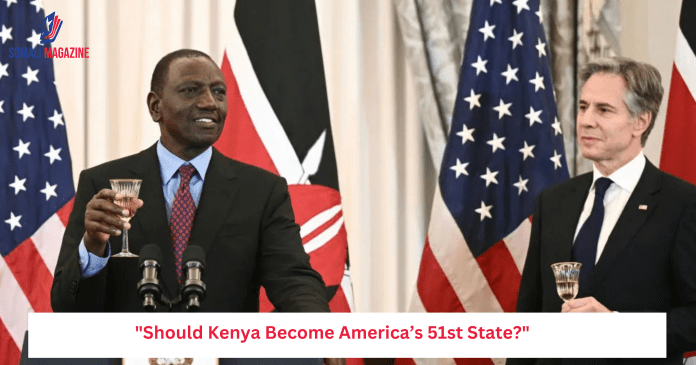Facebook Twitter (X) Instagram Somali Magazine - People's Magazine
In the face of economic hardship, debt, and corruption, a bold idea emerges—what if Kenya joined the U.S. to secure a brighter future?
Anyone who has listened to stories from Kenya’s independence generation or read Caroline Elkins’ British Gulag knows just how cruel and violent British colonisation was. The British, like other colonial powers, believed they were justified in stealing land and abusing people under the excuse of “civilizing” them. Many Africans were tortured in horrific ways—being beaten, jailed, and even killed—often just for resisting colonial rule. Britain, in particular, has shown little real regret for what it did in Kenya, especially during the brutal Mau Mau uprising between 1952 and 1960.
Still, some argue that colonialism also brought development. Schools, hospitals, railways, and other infrastructure were built. Even though the main goal was to extract African resources, some systems and services did improve. There’s also a belief among certain scholars that Africa today is actually poorer than it was under colonial rule.
Looking at Kenya, the signs of struggle are clear—poverty, debt, and inequality are widespread. For example, the Kenya-Uganda railway, built over a century ago to benefit British interests, barely expanded after independence. Much of the infrastructure left by the British has either collapsed or been destroyed. Some believe that Kenya’s independence, while politically symbolic, may have slowed development rather than accelerated it.
Many African countries have failed to live up to the dreams of independence. Instead of becoming wealthy and stable, they have become plagued by corruption, poor leadership, and weak institutions. This has led some to say that colonial governments were more organized, fair, and less tribal than current African governments.
That said, it’s clear that African nations had to come into contact with the West to prepare for the modern world—a world driven by Western technology, languages, and systems of governance. Without that interaction, African societies might have fallen too far behind.
Take the United States, for example. It was once a British colony, just like Kenya. But after gaining independence in 1776, it grew into a global superpower. It also took over smaller territories like Puerto Rico, Guam, and Samoa. More recently, former president Donald Trump suggested the U.S. should acquire places like Canada or Greenland. These suggestions reveal a desire to expand America’s influence—perhaps making up for the time it wasn’t colonizing like Britain or France.
Countries like Canada and Denmark would never agree to Trump’s ideas. They’re safer, less corrupt, and have higher standards of living than the U.S. But for a country like Kenya—struggling economically and burdened by debt—the idea of joining forces with a wealthy superpower isn’t completely outrageous.
This leads to a bold thought: What if Kenya invited Trump to ‘adopt’ us? Not colonise us, but form a partnership where the U.S. takes responsibility for some of our debts and governance, while helping us grow. It could be a natural extension of existing U.S.–Kenya collaborations, like the military presence in Somalia or aid support.
If this happened, Kenya might benefit in several ways: we’d gain access to U.S. resources and defense, we’d build stronger diplomatic ties, and we might even tackle corruption more effectively with U.S. oversight. Plus, American citizenship—whether partial or full—would be attractive to many Kenyans.
In tough times, it’s not crazy to dream about bold solutions. Maybe becoming the 51st state of the U.S. sounds wild, but when you think of the economic relief, opportunity, and global power that could come with it, it’s tempting to at least consider.

